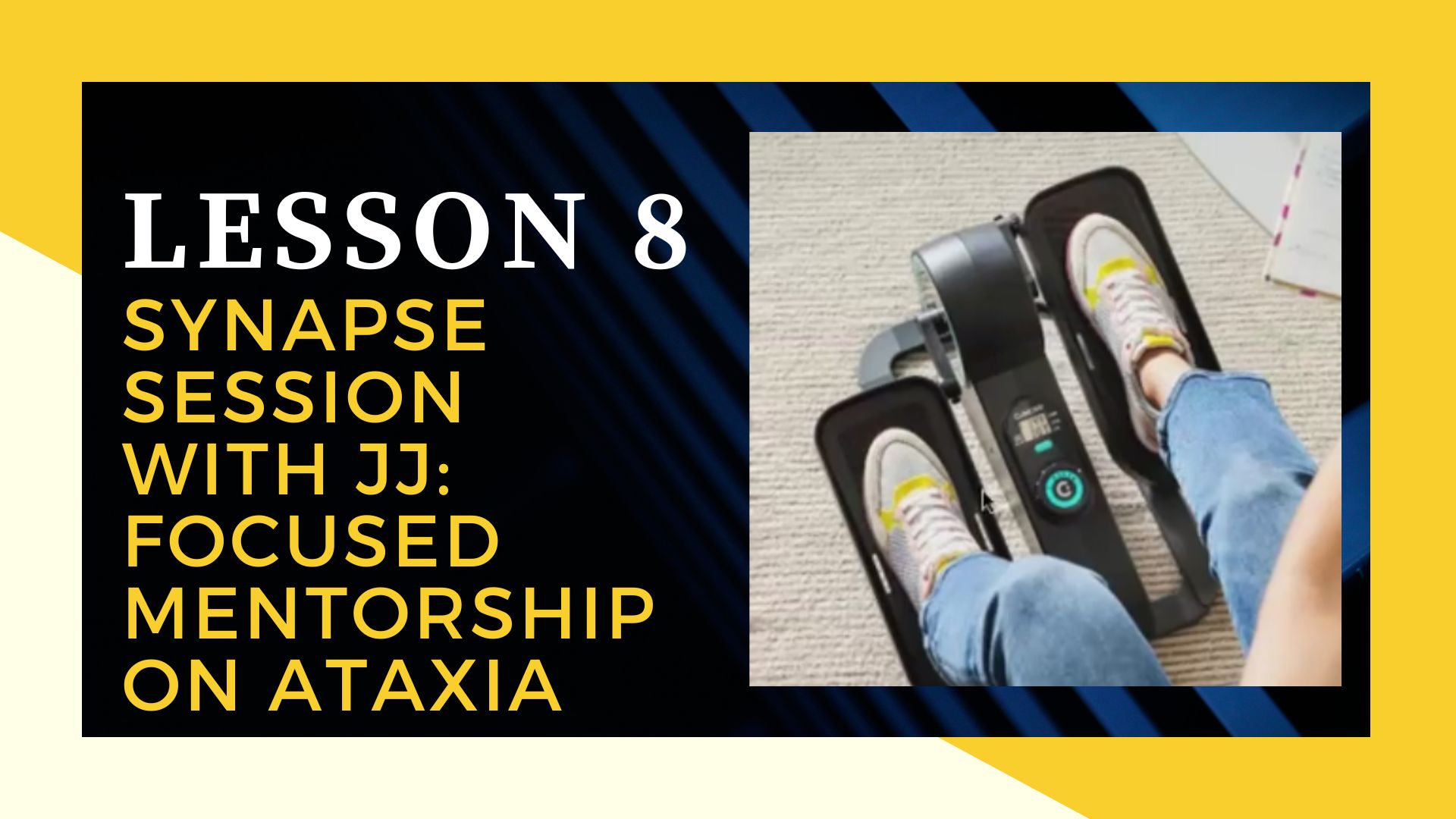ATAXIA MASTERCLASS FOR PTs AND OTs
How Neuro Therapists Can Help their Clients with Ataxia Through Knowledge Translation of Key Concepts into Clinical Practice
Managing ataxia can be challenging for both people with ataxia and therapists alike because of the complexity and impact on quality of life.
It can feel daunting for both new and experienced practitioners because it's not well understood and difficult to manage.
It’s amazing when you help a person with a neurological condition improve their reaching, gait or posture…
But what happens when uncontrolled ataxia makes activities of daily living so frustrating for your client or causes them to fall while walking to the bathroom?
These are the times both you and your client can feel like giving up because you just don’t know what to do.
Listen…
Knowing how to address, manage and overcome the impact of uncontrolled ataxia on function can literally be life changing for your clients.
You may not even realize the misperceptions you’re operating under about treating ataxia holding you back. Plus, all-consuming ataxia can affect the arms, legs and trunk impairing function, motor control and independence.
You may wonder...
What are the best evidence-based treatment interventions for someone with ataxic gait?
How do you improve trunk control and balance in someone with ataxia?
Where do you even begin?! And how do you know when to focus on compensation and when to focus on recovery?
If you’ve ever been frustrated by Ataxia, you’re going to LOVE what we have for you!
Introducing...
THE ULTIMATE ATAXIA MASTERCLASS FOR PTs AND OTs!
With this comprehensive mini course, you no longer need to feel lost when treating clients with this challenging neuro symptom. Learn fresh ideas to implement into your practice immediately and fear ataxia no more!
** NEW CONTENT ADDED!
NOW WITH 6.25 CONTACT HOURS
WHAT'S INSIDE THIS COMPREHENSIVE COURSE?
Lesson 1: Evidence-Based Treatment For Patients With Ataxia
In this lesson, JJ Mowder-Tinney will highlight a variety of treatment ideas when working with someone with ataxia. The priority will be increasing challenge and intensity while reviewing the latest support and guidance in the evidence.

Lesson 2: Translating Ataxia Evidence Into Actual Patient Cases
We will highlight actual Patient Cases to allow integration of the many concepts we discussed about working with someone with ataxia.

Lesson 3: Ataxia Case Study on a Person with Paraneoplastic Cerebellar Degeneration
In this patient case, JJ Mowder-Tinney presents the medical history and mobility impairments related to ataxia in a person with paraneoplastic cerebellar degeneration. She then reviews various treatment strategies that have been tried in this patient to treat his ataxia and finishes the case study by highlighting a variety of treatment ideas with progressions to continue working with this patient.

Lesson 4: Ataxia Case Study on a Person with Cerebellar Aneurysm
In this case study, Claire McLean introduces a patient with ataxia since suffering a cerebellar aneurysm 10 years ago, with a subsequent L MCA CVA. JJ Mowder-Tinney then performs a patient assessment of gait and mobility, followed by trials of multiple intervention strategies to address the ataxia related impairments providing multiple ideas for you to try with your patients and how they will impact function.

Lesson 5: Navigating Ataxia Treatment: Practical Tools for PTs and OTs
In this lesson, we’ll explore evidence-based strategies, assessment tools, and treatment approaches to enhance your confidence and improve your patients' functional mobility, ADLs, and gait.

Lesson 6: Therapeutic Management of Individuals with Ataxia
In this lesson, we’ll dive into the therapeutic management of individuals with ataxia, focusing on the critical role of physical therapy. You'll learn about the physical therapy examination process and how to utilize outcome measures to assess progress in patients with ataxia. We’ll explore the current evidence on effective treatment approaches, emphasizing neuroplasticity and motor learning as foundational principles.

Lesson 7: Improving Dexterity and ADL Performance with Ataxia
In this lesson, we will explore strategies for improving dexterity and activities of daily living (ADL) performance in individuals with ataxia. You'll gain insight into how ataxia impacts common self-care tasks, such as dressing, eating, grooming, and toileting, and how to modify these tasks for maximum effectiveness.

Lesson 8: Synapse Session with JJ: Focused Mentorship on Ataxia
This mentorship session provides you with a chance to learn directly from JJ as she addresses common challenges and provides guidance on your specific questions. With JJ’s expert input, you’ll have the chance to reflect on real-life cases, discuss intervention strategies, and explore clinical tips that can be applied immediately in your practice.

BONUS Resources:
1. Rhythmic Auditory Stimulation Handout
2. Rate of Perceived Stability Scale
3. Documentation Tips Every Neuro Therapist Should Know

TRULY A NON-TRADITIONAL EDUCATION MODEL THAT FITS YOU! IT'S A NO-BRAINER!
IN SUMMARY, HERE'S WHAT YOU'LL GET...
✔ Lesson 1: Evidence Based Treatments for People with Ataxia
✔ Lesson 2: Translating Ataxia Evidence into Actual Patient Cases
✔ Lesson 3: Ataxia Case Study on a Person with Paraneoplastic Cerebellar Degeneration
✔ Lesson 4: Ataxia Case Study on a Person with Cerebellar Aneurysm
✔ Lesson 5: Navigating Ataxia Treatment: Practical Tools for PTs and OTs
✔ Lesson 6: Therapeutic Management of Individuals with Ataxia
✔ Lesson 7: Improving Dexterity and ADL Performance with Ataxia
✔ Lesson 8: Synapse Session with JJ: Focused Mentorship on Ataxia
✔ Bonus Resources: RAS Handout, RPS Scale, Documentation Tips
✔ 6.25 CONTACT HOURS
AND HERE'S WHAT PARTICIPANTS ARE SAYING...






Your desire to be the best you can be for your clients is what keeps you seeking more learning opportunities.
Unfortunately, there isn’t a lot of focused content addressing exactly what you need...
You may find basic content out there, but what about specific challenges, the hardest problems, and the latest Ataxia research?

